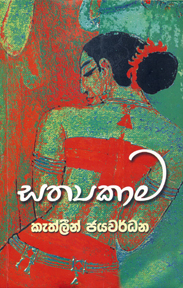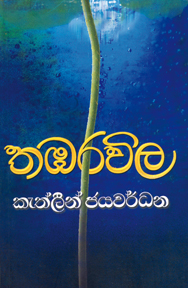|
Invasive plant emerges among the grass :
A personal odyssey in search of true love
by Ranga CHANDRARATHNE
Kathleen Jayawardene is the author of ‘Sathya Kama’, a novel widely
held as a tour de force in contemporary Sinhala literature. The novel is
set against Buddha’s time in India where many important philosophical
discussions were carried out amidst unprecedented economic prosperity.
The protagonist in the novel is on a journey of discovery the true
meaning of love. The novel is marked for its refined language with no
mistakes in grammar and masterly depiction of nature and Buddha’s time
in India.
 |
|
Kathleen Jayawardene:
author of Sathyakama |
 “Invasive plant emerged among the grass seemed to be on a journey
running fast overpowering the blades of grass. It was because of the
twinkling white flowers here and there that one could see that invasive
play running up embracing Devadara trees in the moonlight. Like the fog
that gathered and dispersed, thoughts of the past dispersed and gathered
again.” “The lake is silent. Lake’s water is placid.” It would not be
disturbed if not for the external influence. This is why placid lake is
different from meandering river. “Invasive plant emerged among the grass seemed to be on a journey
running fast overpowering the blades of grass. It was because of the
twinkling white flowers here and there that one could see that invasive
play running up embracing Devadara trees in the moonlight. Like the fog
that gathered and dispersed, thoughts of the past dispersed and gathered
again.” “The lake is silent. Lake’s water is placid.” It would not be
disturbed if not for the external influence. This is why placid lake is
different from meandering river.
He saw his reflection through the tiny fishes that swam without
disturbing the water. The scene tends to baffle him with gripping fear
and deep sadness. On the very moment, he thought of how Samujja saw him.
Water possessed demon..?
- Satyakama.
One of the prominent features of the novel is the author’s ability to
articulate profound philosophical thoughts in a lucid and
straightforward and unpretentious language. It is evident from the
photographic description of the era. The author has captured the
socio-economic milieu of Buddha’s time and the inner social life of the
society. Philosophical thinking is interspersed with magnificent
descriptions of nature which also sychoronised with changing moods of
the traveller Sathyakama. From the beginning to the end, the journey is
a discovery of truth. The author discusses the true meaning of love
whether it is only a strong physical bondage or whether there a
spiritual element to it.
Her enunciation is self-effacing and most suited to the theme. Her
style of writing in Satyakama stands out for genuine sequence and apt
dialogues which have become an integral part of characters.
Since the delivery of descriptions and dialogues has been sparingly
used, they are at no point stifle the interest of the reader and are in
perfect harmony with literary theories. Application of literary theory
is one of the prominent criteria in evaluating literary productions
throughout the world.
The writer is one who expands the horizons of colloquial idiom and
introduces new usages and phraseology into the circulation.
All characteristics of Kathleen’s writings prove that she is one of
the gifted writers.
Here is an exclusive interview with Kathleen Jayewardene on literary
scene and criteria adapted by award committees.
Q: In your opinion how do you define literary creation?
A: From time to time, scholars have given diverse definitions for the
process of literary creations.
|
Intellectuals on Sathyakama
“When the horses were running fast, he
felt the fragrance of the fauna and flora that came with the summer
breeze. He faced the breeze from a window of the horse-driven carriage,
experienced the teasing sensation of spreading hair over forehead, cheek
and neck.” We also feel going on this journey. Wind touches on. We can
understand everything. Therefore, I would say don’t try to set up false
standards by giving awards to refugee literature.” - Prof. Sucharitha
Gamlath.
“In general the novel has brilliantly
depicted the social life of the Buddha’s time. The writer’s success is
evident as she was able to generate a pleasant memory of the time in the
reader.” - Prof. K.N.O. Dharmadasa.
“Is love only a physical attraction? If
not is it a great state of mind? The novel should be read several times
to experience several states and the vision of the writer. The writer
demonstrates excellent language skills in penning this novel which was
written with a great deal of practice.” - Prof. Somaratne Balasuriya
|
However, invariably literary creator or a writer should also be an
avid reader. It is a necessary criterion. He or she should go through
that process of reading and appreciating literature before embarking
upon a career in writing. Even after becoming a writer, it is also
essential for a writer to practise the craft regularly, perhaps, with
insight.
The writer is also a kind of critic. He or she should be a keen
observer of the environment and of course, of the human behaviour.
At the same time, the writer should also cultivate the skill of
deriving inspiration from secondary experiences such as the experiences
of the others and use them for creative writing.
What I believe is that the writer should cultivate an inquisitive
mind as well as he should be a bit sceptical about what he observes. In
this regard, individual issues are of paramount importance. At times,
the writer himself confronts actual problems.
The writer should inquire into the nexus between man and the process
of thinking, psychology analysis plays an important role in this regard.
For instance, Psychologist such as Sigmund Freud and Carl Jung have
explored how forces dormant in the subconscious affect the behavioral
patterns of man. Buddhism also explains such functions in the
subconscious of beings. For a writer, it is important to study those
psychological factors, diverse states of mind and to arrive at
independent conclusions and interpretations. Since mere finding out
causes for them alone would not be sufficient, a writer should be a
creator of new concepts and perceptions.
Therefore, the writer should set new traditions and novel
interpretations that spring from his pen. I firmly believe that it is
essential for a writer to acquire and posses, at least, some knowledge
of philosophy and he should be capable of interpreting them. It is
because that writing is not merely engaging in an exercise of reporting.
For instance, when one heard of a gruesome murder, the picture that
emerges in mind is of the ruthless murderer. That is on the very
instance of the murder which we have either seen or heard of as a brutal
act. Everyone of us will agree irrespective of circumstances, that one
has absolutely no right to take someone else’s life.
However, on the reflection of the state of mind of the murderer
before committing the act and the process of subsequent thinking on the
part of the murderer, that rather gloomy picture would tend to fade
away. This is amply evident in masterpieces of literature such as Leo
Tolstoy’s ‘Kreutzer Sonata’. In the story, a husband confesses on the
murder of his wife.
Like the above instances, the creator should thoroughly examine his
experiences and reflect on them. Unless the creator is thoroughly
immersed in the character, he will not be able to produce a successful
piece of writing. Once Tolstoy stated that writer’s work becoming a
great work or ignorable piece of writing is dependent on the sincerity
of purpose of the writer.
Q: On examination of your literary work, some observe an apparent
tilt towards Buddhist psychology. Does that mean that you always draw
inspiration from Buddhism?
A: As I told you earlier, the creator is a keen observer of the
environment. Let us think in this manner. In the morning the sun rises
and in the evening it goes down. Flowers blossom and fade away in the
evening. Whether one may like it or not this is what actually happens.
In other words, this is the law of nature. In this real life scenario,
we observe the principles of impermanency and constant change at work.
No one can deny that. Whenever writer comes out with this, the critic
would say that he subscribes to the Buddhist point of view. I am really
cannot help it. When I am engaged in creative writing and describing the
nature and the world at large, my views may be akin to those held in the
philosophy of Buddhism. It is something which I cannot avoid.
Q: There were several instances where you had expressed your dismay
at the culture of literary criticism in the country and the evaluation
of literary works especially by diverse evaluating bodies for awards.
Are you totally rejecting the criticisms and conclusions arrived at?
A: It is my view that critics in general very often impose their
views without supporting their arguments. Often they exploit the
authority they enjoy in society. However, the public, today, is in a
position to see through such evaluations aimed at meeting their own ends
and evaluations based on unholy alliances and cronyism. This often
happens. The evaluations failed to adapt wide ranging criteria for
arriving at judgments.
 This position has been explored well in a critical essay entitled ‘An
Essay on Criticism’ which has recently been translated into Sinhala by
Prof. A.V. Suraweera. In the chapter ‘Value and Criteria’ this position
has been articulated. It states “The only criterion that could be made
use of for judgment of a literary work apart from the time it had
enjoyed the respect of the people is the common sense regard of
readership not tainted by the passing literary likes and dislikes. I
believe that readership in the country are above both the writer and the
critic in terms of literary sensibility. It is the readership who will,
ultimately, foolproof the contemporary culture of criticism as well as
the verdict on literary products. This position has been explored well in a critical essay entitled ‘An
Essay on Criticism’ which has recently been translated into Sinhala by
Prof. A.V. Suraweera. In the chapter ‘Value and Criteria’ this position
has been articulated. It states “The only criterion that could be made
use of for judgment of a literary work apart from the time it had
enjoyed the respect of the people is the common sense regard of
readership not tainted by the passing literary likes and dislikes. I
believe that readership in the country are above both the writer and the
critic in terms of literary sensibility. It is the readership who will,
ultimately, foolproof the contemporary culture of criticism as well as
the verdict on literary products.
Q: So what are your suggestions to improve the quality and
composition of literary evaluation bodies?
A: In ideal scenario, the Literary Evaluation Bodies (LEB) should be
a place where experts from diverse fields of literature, persons of
divergent views and of different age meet. Such an LEB should also be
made up of those who appreciate, for instance, classical literature,
latest literary trends such as surrealism and even those who draw
material from witchcraft.
New ideals emerge from a clash of such divergent ideas and views.
What really has become of LEB? Those who were appointed to LEB would get
their friends and evaluate the literary work at their whims and fancies.
There is hardly any oppositional views and dissenting opinion
expressed. It is questionable that how many of those in LEB are
conversant with the latest literary trends? Very often, these panellists
belong to the same school of thinking. Against such a backdrop, how
could fair judgments emerge from the LEB?
|

